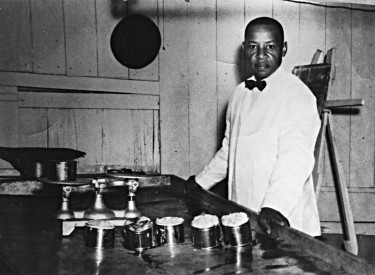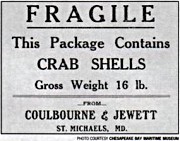
Photo: Chesapeake Bay Maritime Museum
gift of Blanche Jewett
When the time came for Frederick S. Jewett and his business partner William H.T. Coulbourne to educate their families, the patriarchs of a flourishing black-owned seafood company in St. Michaels, Md. sent their children south to Princess Anne Academy.
Coulbourne’s step-daughter, Cornelia Marguerite, enrolled first and finished her studies in 1915. She was the first of three generations to graduate from the school that evolved into the University of Maryland Eastern Shore.
Two of Jewett’s sons soon followed. Tragically, Wilmore Jewett drowned in July 1921, two years before his brother, Elwood, graduated from what was then a prep school. Elwood’s senior-year theme was “Safe Guarding the Youth,” according to a June 1923 commencement program that included the names of 24 other students.
Elwood Small Jewett went on to study business administration at Wilberforce Academy in Ohio, where he also managed a student singing group. He returned to St. Michaels in 1928 to work as a bookkeeper in his father’s business.
Choosing Princess Anne Academy was neither difficult nor far-fetched for Coulbourne or the elder Jewett. They grew up in the Somerset County hamlet of Hopewell, but found success as young entrepreneurs in Talbot County, where they became wholesale seafood distributors at the turn of the 20th century.
Coulbourne & Jewett Seafood Packing Co. became a well-known and popular Eastern Shore business in the first half of the 20th century. It was among Maryland’s most successful minority-owned businesses — and with as many as 100 employees — was St. Michaels’ largest employer.
The founders were shrewd businessmen who developed packaging and marketing techniques that made them industry leaders. Frederick Jewett is widely credited with conceiving the crab meat grading system — back fin, claw, lump — still in use a century later.
People looking for work traveled to the Coulbourne & Jewett plant from as far away as Crisfield, another Chesapeake Bay town where harvesting and packing seafood for market once thrived. The company initially handled herring and oysters, but shifted to crab when the meat emerged as a much-in-demand delicacy. Product was shipped to customers in major East Coast and Midwest cities.

As the country began to emerge from the Great Depression, Elwood Jewett boasted the company processed a million pounds of crabs annually from 1935 to 1940. He assumed day-to-day management of the business in the 1940s when his father retired.
Father and son also were lay leaders in the Methodist Church conference, which founded Princess Anne Academy in 1886.
In a September 2007 newspaper article, a long-retired employee described how a nattily attired Elwood Jewett often pitched in to help unload boats on Saturdays.
“He would always wear a white jacket … a black bowtie or black tie, and black pants and black dress shoes,” Alice Palmer told The Star-Democrat of Easton. “He always said, ‘A businessman should look like a businessman.’”
Crab meat production reached its zenith in the 1950s, when Elwood Jewett was politically active in his native Talbot County. He was executive chairman of the local Colored Republican Club that backed the unsuccessful 1952 U.S. senatorial bid of H. Grady Gore, a cousin of former Vice President Al Gore.
Overharvesting, high prices and tougher government health rules put many Chesapeake region seafood packers out of business, and led Elwood Jewett in the mid-1960s to sell his company, according to the Chesapeake Bay Maritime Museum. The museum is on Navy Point in St. Michaels, where the Coulbourne & Jewett plant once stood.
Elwood Small Jewett, Princess Anne Academy class of 1923, died in June 1977. He was 73.
Sources: The (Easton) Star-Democrat & Afro-American newspapers, and the “Weather Gauge,” a Chesapeake Bay Maritime Museum publication.

